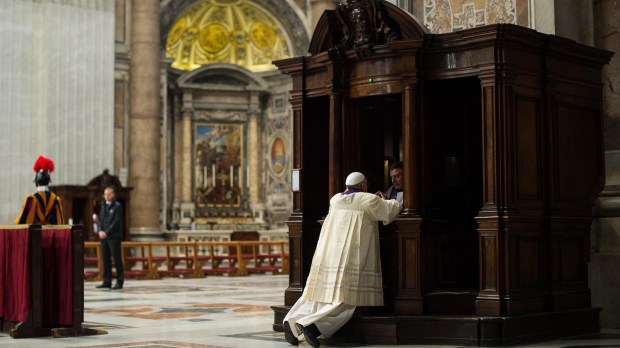Once we have finished confessing our sins in Confession (the sacrament of Penance), the priest confessor assigns us a specific penance. As the Catechism states, “all good works may be given as penances” including “works of piety, charity, [and] mortification” (1460). But especially prayers.
St. John Paul II reminds us that the penances believers receive in Confession “are the sign of the personal commitment that the Christian has made to God, in the Sacrament, to begin a new life.” For this reason, “they should not be reduced to mere formulas to be recited, but should consist of acts of worship, charity, mercy, or reparation (31). In other words, we should carry out the penance assigned reverently and in a spirit of fervent prayer. For the performance of penance is a purposeful break with evil. By doing our penance, we actively turn our back on sin and place ourselves on the path to holiness.
But sometimes the penance we receive can seem almost too simple. Dominican Fr. Romanus Cessario, in his beautiful new book The Seven Sacraments, helps us with this:
Oftentimes, the penance given in the confessional by the Catholic priest consists of the recitation of certain familiar prayers — for example, to say the Hail Mary so many times. This nominal penance achieves a meritorious status beyond what its simple execution may merit by reason of the superabundant meritoriousness of Christ’s saving sacrifice that the sacrament of Penance communicates to the performance of a prescribed penance (225).
We pray our penance in a disposition of heartfelt humility, thankfulness, and awe. By the penance you do, you are not buying yourself back into God’s good graces. It is not you who are paying for the absolution you received. Jesus Christ himself paid that price when he died for us on the cross.
The satisfaction that we make for our sins is not so much ours as though it were not done through Jesus Christ. We who can do nothing ourselves, as if just by ourselves, can do all things with the cooperation of “him who strengthens” us (CCC 1460).
The penance we receive is a privilege. Penance helps configure us to Christ:
The pardoned sinner is able to join their own physical and spiritual mortification to the Passion of Jesus who has obtained the forgiveness for them (RP 31).
Through the gift of sacramental penance, a person can “start out on the road of return to the Father” (RP 13). For the penance is meant to be not only a punishment but also a cure. “Raised up from sin, the sinner must still recover his full spiritual health” (CCC 1459). By performing our penance, we repair the harm caused by sin, but we also “re-establish habits befitting a disciple of Christ” (CCC 1494). “Doing penance is directed towards a continuous striving for what is better” (RP 4). And God is eager to accept our completed penance as a fitting means of regaining intimate friendship with him.
~
Follow Fr. Cameron’s series on prayer here.


